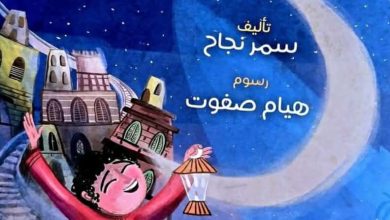Arab Pens Magazine Revives a Serbian Journey to Egypt 99 Years Ago
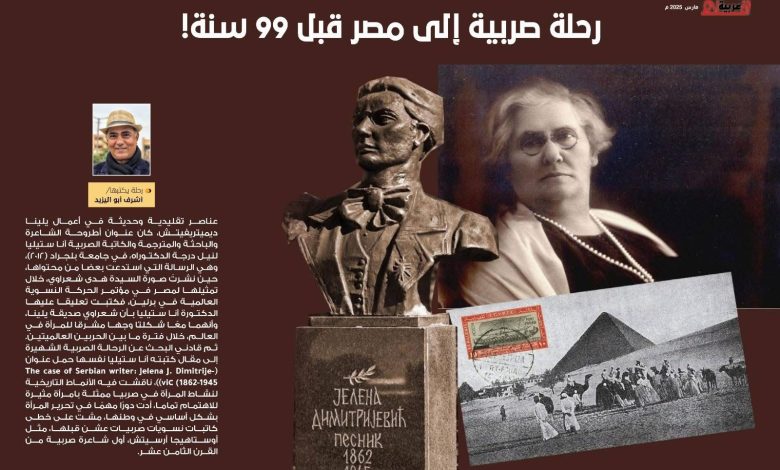
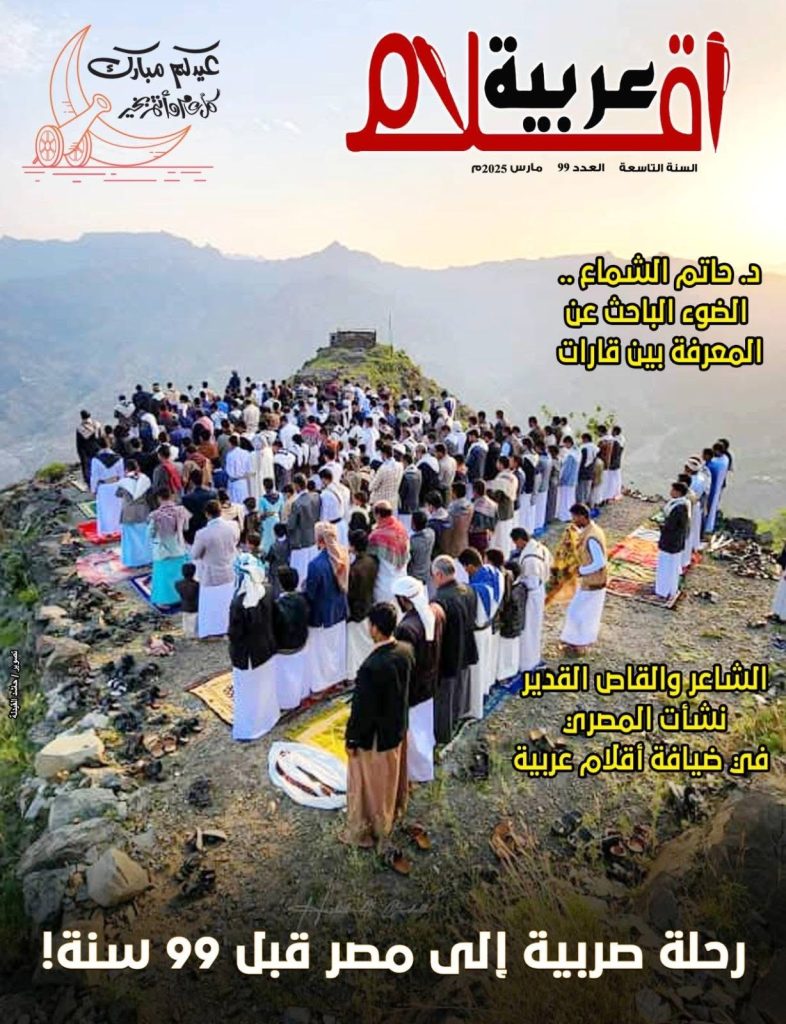
Sana’a, Yemen – 2025
Arab Pens Magazine, a monthly cultural and literary publication based in Yemen’s capital, has announced the release of its latest issue. This edition is rich with diverse content, including investigative reports, literary critiques, social reflections, and creative works.
One of the standout features in this issue, titled “A Serbian Journey to Egypt 99 Years Ago!”, is a historical exploration by writer Ashraf Aboul-Yazid, who translates two travel letters written by Serbian novelist and traveler Jelena Dimitrijević. Her journey to Egypt offered a rare opportunity to meet remarkable figures of her time, such as Egyptian feminist leader Huda Shaarawi. Similarly, on other travels, she encountered Lady Dorab Tata, the Persian princess, and the renowned Indian poet Rabindranath Tagore, whom she met during her visit to India. Dimitrijević’s travel books provided ethnographic and anthropological insights into the eras she chronicled.
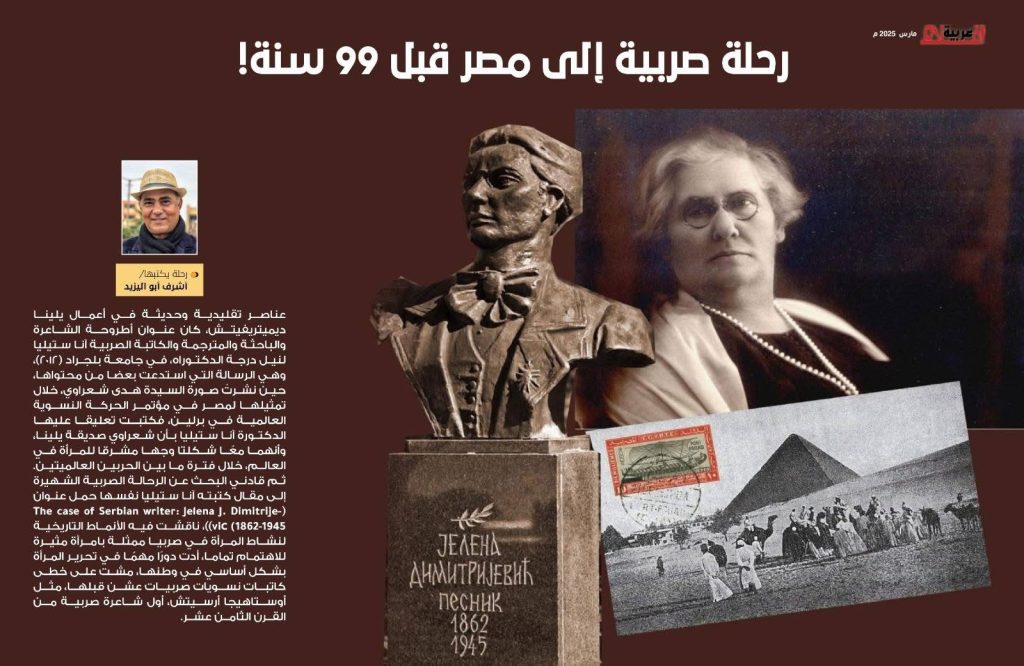
Jelena Dimitrijević is regarded as the first Serbian travel writer and one of the most prolific Serbian female authors. Over her lifetime, she published five extensive travel books covering Niš and Thessaloniki, as well as distant and unfamiliar locations such as India (Letters from India, 1928), the United States (The New World: One Year in America, 1934), North Africa, and the Middle East (Seven Seas and Three Oceans: A Journey Around the World, 1940). Additionally, she authored six works in poetry and fiction, including The New Woman (1912).
Some of Dimitrijević’s books were translated during her lifetime into English, German, Russian, Polish, and Bulgarian. Despite her prominence as the first Serbian woman writer to introduce herself internationally, she was not officially recognized by the authorities at the time—perhaps due to her advocacy for improving women’s roles and status in Serbian society.
An Unforgettable Meeting with Huda Shaarawi
One of the most significant accounts from Dimitrijević’s journey is her December 1926 meeting with Huda Shaarawi, the pioneering Egyptian feminist leader and founder of The Egyptian Woman magazine. Well-prepared for the discussion, Dimitrijević asked Shaarawi: “Will you demand voting rights for your women?” She noted Shaarawi’s sudden change in expression, as if the question had caught her off guard. Shaarawi responded that she would first seek voting rights only for educated Egyptian women.
Dimitrijević’s account highlights the exclusive and limited political rights sought by elite feminists in Egypt, which did not necessarily improve the status of all Egyptian women.
Seven Seas and Three Oceans: Observing the World
According to researcher Svetlana Tomić, Dimitrijević’s travel writings from the 1930s represent a significant contribution to Serbian literature, culture, and politics. One of the key messages in Seven Seas and Three Oceans is that “people’s wealth lies in observing, understanding, and learning about the world,” a concept closely aligned with today’s ideas of multiculturalism and embracing human diversity.
Dimitrijević, who began her literary career as a poet, was referred to by scholars as the “Serbian Sappho” for her poetic talent. Interestingly, she had previously translated Sappho’s Greek poetry, reflecting her broader engagement with literary liberation and cross-cultural influences.
A Journey from Alexandria to Cairo: Excerpts from the Seventh Letter
One of the translated letters from Dimitrijević’s book offers a vivid first-hand account of her journey from Alexandria to Cairo:
“That journey from Alexandria to Cairo, passing through the cultivated fields of the Nile Valley, will never be forgotten. It felt like a real voyage across Egypt, yet also like a dream. Egypt is a sacred land, just like Palestine. No religious sentiment could overwhelm me more than I feel here—not even in Bethlehem, where our Savior was born, nor in Jerusalem, where He died for us sinners…
I gaze at the Nile with immense fascination, as though it flows near the graves of my ancestors, though the river itself is alive—moving, speaking… Blessed are those who understand the language of this eternal old man, still providing sustenance to an entire nation, just as it has done since ancient times.
I stand by the train window as it speeds through the Nile Valley, passing fields of sugarcane, banana trees, rice paddies, and blossoming cotton plants. Towering palm trees line the landscape, while men in colorful robes and women in black garments walk along dirt roads, some on foot, others riding camels. I think of the Nile. A moment later, something in the distance catches my attention—entire herds of camels, those coarse-haired creatures that, despite their ruggedness, remind me that I am traveling across Africa, across Egypt, evoking visions of the Libyan and Arabian deserts, even as I pass through the fertile Nile Valley…”
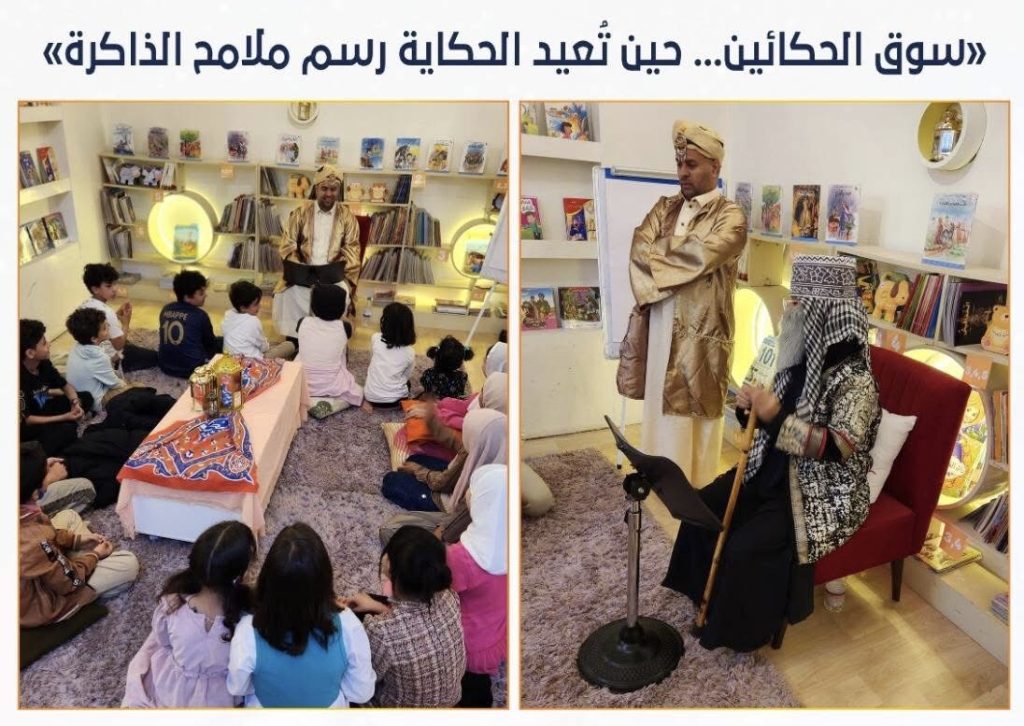
Featured Articles in the Latest Issue
The latest issue of Arab Pens also includes a literary analysis by Ibrahim Rasool titled The Crisis of Islamic Identity in the Novel “The Stone of Happiness” by Azhar Jirjis. The magazine opens with a photo-essay on the role of storytelling in shaping collective memory titled The Marketplace of Tales: When Stories Threaten the Art of Remembering.
In the criticism section, readers can explore:
-
The Critic: The Strategic Mind Behind Creativity by Mohammed Al-Humaidi
-
The Memory of Love by Mohammed Nasser Al-Ja’mi
-
Society and the Stereotypical Image in Egyptian Cinema, a critical study by Dr. Hatem Al-Sha’maa
The editorial team of Arab Pens Magazine includes Editor-in-Chief Samar Al-Rumayma, Managing Editor Dr. Mukhtar Muharram, and Deputy Editor Ali Al-Naham.
The magazine is available in print at Library (D), Sana’a, near the Old University.
Contact Information:
📧 Email: samarronima@gmail.com




